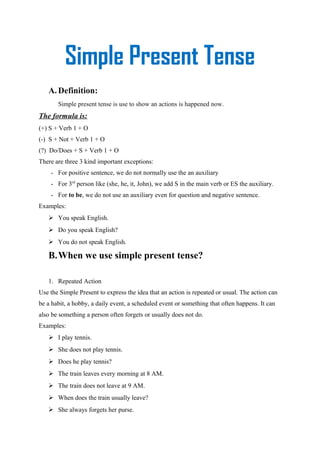
Simple presen1
- 1. Simple Present Tense A. Definition: Simple present tense is use to show an actions is happened now. The formula is: (+) S + Verb 1 + O (-) S + Not + Verb 1 + O (?) Do/Does + S + Verb 1 + O There are three 3 kind important exceptions: - For positive sentence, we do not normally use the an auxiliary - For 3rd person like (she, he, it, John), we add S in the main verb or ES the auxiliary. - For to be, we do not use an auxiliary even for question and negative sentence. Examples: You speak English. Do you speak English? You do not speak English. B.When we use simple present tense? 1. Repeated Action Use the Simple Present to express the idea that an action is repeated or usual. The action can be a habit, a hobby, a daily event, a scheduled event or something that often happens. It can also be something a person often forgets or usually does not do. Examples: I play tennis. She does not play tennis. Does he play tennis? The train leaves every morning at 8 AM. The train does not leave at 9 AM. When does the train usually leave? She always forgets her purse.
- 2. He never forgets his wallet. Every twelve months, the Earth circles the Sun. Does the Sun circle the Earth? 2. Facts or Generalizations The Simple Present can also indicate the speaker believes that a fact was true before, is true now, and will be true in the future. It is not important if the speaker is correct about the fact. It is also used to make generalizations about people or things. Examples: Cats like milk. Birds do not like milk. Do pigs like milk? California is in America. California is not in the United Kingdom. Windows are made of glass. Windows are not made of wood. New York is a small city. IT IS NOT IMPORTANT THAT THIS FACT IS UNTRUE. 3. Scheduled Events in the Near Future Speakers occasionally use Simple Present to talk about scheduled events in the near future. This is most commonly done when talking about public transportation, but it can be used with other scheduled events as well. Examples: The train leaves tonight at 6 PM. The bus does not arrive at 11 AM, it arrives at 11 PM. When do we board the plane? The party starts at 8 o'clock. When does class begin tomorrow? 4. Now (Non-Continuous Verbs)
- 3. Speakers sometimes use the Simple Present to express the idea that an action is happening or is not happening now. This can only be done with Non-Continuous Verbs and certain Mixed Verbs. Examples: I am here now. She is not here now. He needs help right now. He does not need help now. He has his passport in his hand. Do you have your passport with you? 5. ADVERB PLACEMENT The examples below show the placement for grammar adverbs such as: always, only, never, ever, still, just, etc. Examples: You only speak English. Do you only speak English? ACTIVE / PASSIVE Examples: Once a week, Tom cleans the car. ACTIVE Once a week, the car is cleaned by Tom. PASSIVE
